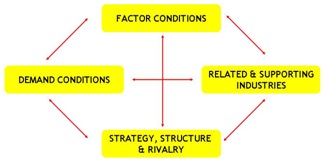|
 |
|
 |
|
|
||
Michael Porter, The Competitive Advantage of Nations
(1990)
American Harvard Business School professor and leading expert on strategy and the competitive advantage of companies and countries (pictured right). His reputation is based on this book and two others:
See also... Michael Porter in the Management Gurus section.
Book summary
Porter's diamond model This describes how a country can achieve international success in a particular industry In addition to chance and government action, there are four interrelated factors that determine global success:
1. Factor conditions The quality and quantity of a country’s factors of production:
2. Demand conditions (the popularity of the industry’s product with home customers).
3. Related and supporting industries (the international competitiveness of suppliers and associated industries).
4. Firm strategy, structure and rivalry (the competitiveness of domestic companies that will spur them to improve and compete globally).
What makes a country rich? Its businesses beating its worldwide competitors through higher productivity from: a) better quality (increasing product differentiation).
b) greater efficiency (reducing costs) c) continual organizational change and innovation (new technology and products and better ways of doing things).
Don't support declining industries... Businesses’ global competitiveness (and so national prosperity) can be reduced by government action to reduce the social costs of change (like supporting declining industries).
Choosing between national values and
prosperity... As global competition increases, countries will eventually be forced to make a choice between:
National cultures and character are not threatened by global competition but can help a country achieve international success.
How can companies become globally competitive?
1. Brilliant people Employees with the right:
2. Change and innovation
“Nations succeed in industries where pressures are created that overcome inertia and promote ongoing improvement and innovation instead of an easy life”, says Porter.
3. Clusters of companies Countries succeed in groups (or clusters) of interconnected companies and suppliers in a particular industry (like California's Silicon Valley)
Key quotes on economics A nation’s standard of living in the long term depends on its ability to attain a high and rising level of productivity in the industries in which its firms compete. This rests on the capacity of its firms to achieve improving quality or greater efficiency. Nations don't compete. Companies compete. Nations can make it hard or easy to do.
Key quotes on globalization Incentives, effort, perseverance, innovation and especially competition are the source of economic progress in any nation and the basis for productive, satisfied citizens. To achieve competitive success, firms from the nation must possess a competitive advantage in the form of either lower costs or differentiated products that command premium prices. Nations succeed where country circumstances support the pursuit of the proper strategy for a particular industry or segment.
Key quote on globalization and change Nations succeed in industries where pressures are created that overcome inertia and promote ongoing improvement and innovation instead of an easy life.
|
|
|
||
|
|
||
| Copyright © wisdomtowin.com 2025 All Rights Reserved | ||
|











